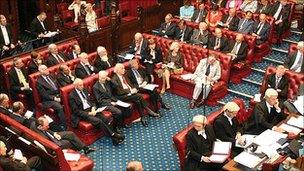House of Lords full, peers tell David Cameron
- Published

David Cameron has been told by a cross-party group of senior peers that the House of Lords is "full" and he must stop creating new members.
The prime minister has created more peers more quickly than any of his post-war predecessors, having ennobled 117 people in less than a year.
The House of Lords now has 792 members who are entitled to attend and vote.
The peers warn that this number is "unsustainable" and is damaging the effectiveness of the Lords.
The warning comes in a report from the independent Constitution Unit at University College London and has been endorsed by 13 peers from all parties.
They include former Cabinet Secretary Lord Butler; former Speaker Baroness Boothroyd; the convenor of the independent crossbenchers, Baroness De Souza; former Labour leader of the Lords Baroness Jay; former Tory Cabinet ministers Lord Forsyth and Lord Mackay of Clashfern; former Labour cabinet minister Lord Adonis; former Liberal leader Lord Steel of Aikwood; and former Master of the Rolls Lord Woolf.
'Overcrowded'
They warn that the House of Lords is now overcrowded with members competing for seats in the chamber and office space outside.
They say there is a "fractious atmosphere" with many peers frustrated at their inability to take part in debates and they warn that the rapid influx of new peers - particularly ex-MPs - has had a negative impact on the Lords' non-partisan ethos and courteous atmosphere.
They are calling for an immediate moratorium on new appointments, a new cap so that the Lords never has more than 750 members, a new mechanism that would allow peers to retire, and fresh curbs on the power of a prime minister to appoint so many peers in the first place.
"Peers are faced with working in overcrowded conditions, with limited access to computers and telephones, and little or no space for staff," the Constitution Unit report said. "This is far from conducive to effective working."
"Many more peers are seeking to contribute to debates, ask questions, and become members of committees. This has created a more fractious atmosphere in the chamber, and growing frustration amongst members who cannot contribute effectively."
The only prime minister who came close to the rate of ennoblement seen over the past year was Tony Blair, who created 70 peers in his first year of office in 1997-98.
'Changed behaviour'
The report said the arrival of so many new peers in such a short space of time had had a "negative impact" upon the culture of the upper chamber.
"In the past, members of the House of Lords have been added only gradually, and become socialised in the chamber's practices and conventions," it noted.
"Most obviously, the chamber is known for having a non-partisan ethos, and a courteous atmosphere.
"It has been widely noted - in the media as well as within Parliament itself - that the influx of a large number of new members, including many former MPs, has resulted in changed behaviour.
"The House of Lords' effective functioning has already been compromised by the recent rapid rise in membership, in ways which are damaging its effectiveness. Any further increase in size could fundamentally undermine the chamber's ability to do its job."
A committee chaired by Deputy Prime Minister Nick Clegg is expected to publish a draft bill on proposed reform of the Lords in the next few months but any changes agreed are unlikely to come into effect for some time.
The coalition government is committed to reducing the size of the House of Commons from 650 to 600 MPs at the next election.
- Published19 November 2010
- Published28 May 2010
- Published25 February 2011
- Published17 December 2010